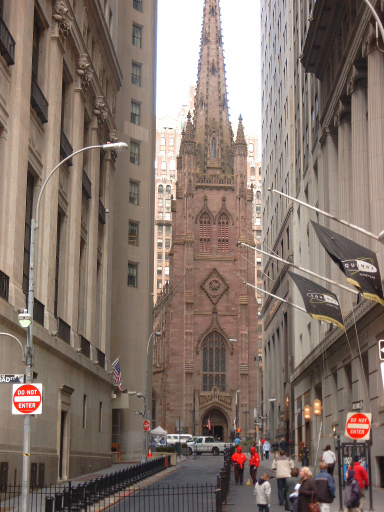Trinity Church
New York NY Building Photos Thumbnails Buildings Home
|
Trinity Church, at 74 Trinity Place in New York City, is a historic full service parish church in the Episcopal Diocese of New York. Trinity Church is located at the intersection of Broadway and Wall Street in downtown Manhattan. George Washington was a member of its congregation for a while. Also figured prominently in 9/11. Rescue personnel slept on its pews when they could take a moment for sleep. When the present Trinity Church was consecrated on Ascension Day May 1, 1846, its soaring Neo-Gothic spire, surmounted by a gilded cross, dominated the skyline of lower Manhattan. Trinity was a welcoming beacon for ships sailing into New York Harbor. Though skyscrapers have risen all around it, Trinity Church still stands as a significant statement of spiritual values in the heart of downtown Manhattan and serves as a center for contemplation, worship, and Christian community. There have been three Trinity Church buildings at Broadway and Wall Street. The present Trinity Church, designed by Richard Upjohn and consecrated on Ascension Day in 1846, is considered a classic example of Gothic Revival architecture and is listed on the National Register of Historic Places. |

|
|
Trinity Church Photo 206, Dec 2007 |

|
|
Trinity Church Photo 207, Dec 2007 |

|
|
Trinity Church doors Photo 209, Dec 2007 |

|
|
Trinity Church doors Photo 210, Dec 2007 |

|
|
Trinity Church, rear side Trinity Church at 79 Broadway, New York City, is a historic, full-service parish church in the Episcopal Diocese of New York. Trinity Church is located at the intersection of Wall Street and Broadway in downtown Manhattan. The third Trinity Church was finished in 1846 and at the time of its completion its 281-foot spire and cross was the highest point in New York until being surpassed in 1890 by the New York World Building. This is the one that we see today. In 1843, Trinity Church's expanding parish was divided due to the burgeoning cityscape and to better serve the needs of its parishioners. The newly formed parish would build Grace Church, to the north on Broadway at 10th street, while original parish would re-build the Trinity Church that stands today. Both Grace and Trinity Churches were completed and consecrated in 1846. The street is Trinity Place, which passes under the Trinity Place Bridge. Completed in 1989, the bridge is a private elevated walkway connecting the rear side of Trinity Church to its parish house across Trinity Place. Photo 340, Oct 2010 |

|
|
Trinity Church Photo 329, Oct 2010 |

|
|
All Saints' Chapel (part of Trinity church) was built as a memorial to The Rev. Dr. Morgan Dix, Rector of Trinity Church from 1862-1908. It is an addition to Trinity Church designed by Thomas Nash and built from 1911-13. The chapel is used primarily for prayer and an occasional private service. Photo 471, Oct 2010 |

|
|
All-Saints Chapel, Tomb of Johm Dupuy, died 1879 Photo 470 |

|
|
Trinity church, interior Photo 474, Oct 2010 |

|
|
Trinity church interior Photo 479, Oct 2010 |

|
|
Trinity Church, interior Photo 480, Oct 2010 |

|
|
Trinity church, interior Photo 484, Oct 2010 |

|
|
The Trinity Root, at Trinity Church The 'Trinity Root', an artist's memorial sculpture of the tree that shielded St. Paul's Chapel from harm on September 11, 2001 On September Eleventh 2001, Trinity Church might have been erased by falling wreckage of the collapsing World Trade Center, but an old sycamore tree in the churchyard cemetery caught and deflected the metal projectiles ---saving the building but losing its own life. The crushed tree was sawed-up and removed, but the stump was saved at a temporary memorial to the 9-11-01 events and also in remembrance of the providential rescue of the church. Later Artist Steve Tobin obtained the tree's root-pack and made a life-sized cast of them in bronze. The freeform roots shape was purposefully up-ended and then painted orange. The sculpture, titled (The) Trinity Root, serves the same purpose as the preserved stump ---though in a more permanent manner. The lost sycamore was replaced by a tall pine named the Tree of Hope. Photo 503, Oct 2010 |

|
|
Trinity Church Steeple Photo 504, Oct 2010 |

|